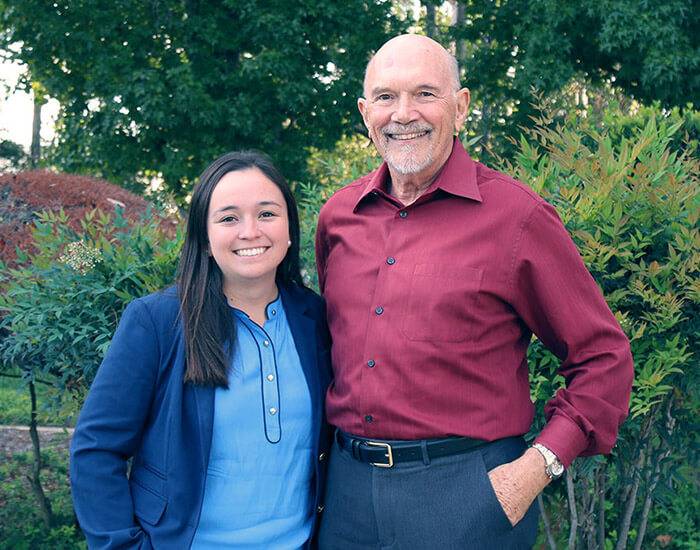A project that was part of Dr. Ian Phillips' Writing an Orphan Drug Application (ALS 432) class recently led to the U.S. Food and Drug Administration (FDA) awarding KGI an orphan drug designation for Rett syndrome.
Orphan drugs are drugs developed for patients with rare diseases; a rare disease is one affecting less than 200,000 individuals. The diseases range from rare cancers to all sorts of rare organ disorders. A large percentage of rare diseases affects children and are often fatal. Eighty percent of rare disorders are genetic in origin. The FDA has incentives to develop drugs for these diseases.
The first step the FDA requires in developing an orphan drug therapy is an orphan drug designation. A "designation" is a formal application proposing a new therapy based on a plausible idea to treat a rare disease.
Dr. Ian Phillips, a Norris Professor at KGI and director of the Center for Rare Disease Therapies, has been teaching the ALS 432 class for several years. In this class, students divide into teams, and each team concentrates on studying a disease and proposing a new therapy for it based on criteria required by the FDA. In fall 2014, the team of Tayler Renshaw, PPC '15, MBS '16; Eunice Lee, PPC '15; Courtney Lamb, PPC '15; and Frances Chang, MBS '15, investigated Rett syndrome, a terrible postnatal neurological disease affecting mostly young girls. The disease progresses through stages of increasing loss of brain function, resulting in problems in brain function for cognitive, sensory, emotional, motor, and autonomic areas. These complications ultimately affect learning, speech, sensory, mood, swallowing/chewing, and digestion. There is currently no drug therapy available.
The KGI student team, led by Tayler Renshaw, proposed a treatment with insulin growth hormone factor 1 (IGF-1), which offsets the genetic loss of a protein that activates neurons. For the project, the team put together data and clinical reports to demonstrate this treatment could work in Rett disease. Upon review and discussion with students, Dr. Phillips sent the request for a designation to the FDA in Washington, DC. On September 21, 2015, the FDA granted the orphan drug designation to KGI. This designation is the stamp of approval needed to take this idea into clinical trials and progress to get a treatment for Rett syndrome to market in the future.
Explaining what inspired her to take part in this project, Tayler said: "Just a few days after our team selected Rett syndrome and began formulating ideas for treatment options, I had a fortuitous encounter with a family at an event in Los Angeles. I sat at the last seat available at a large event last fall, and when I looked down, the man next to me had a Rett syndrome 'Silent Angel' awareness bracelet on. I took a chance and introduced myself and explained our project, and he shared with me that he had a nine-year-old daughter with Rett syndrome."
Tayler's encounter happened to be with Daniel Warner, the chair of the Family Empowerment Board for the Rett Syndrome Foundation. Warner was instrumental in connecting the team with and gaining the support of the chief operating officer and chief scientific officer of the Rett Syndrome Foundation as they pursued the orphan drug designation.
Dr. Phillips explained the bigger picture and why his class is designed so that students can take part in real-world solutions: "The hope now is that the Rett Foundation, armed with our new FDA designation, will be able to find sponsors of clinical trials to get this therapy to market and improve the lives of girls with Rett syndrome."
In reflecting on her experience working on the Rett syndrome project and her overall KGI experience, Tayler believes she is well prepared to begin a career in either industry or the healthcare field. "I plan to apply to medical school next summer and pursue a career as a physician. In my application cycle year, I plan to put my KGI master's degree to use and continue exploring career options in business and regulatory aspects of industry, potentially with a focus on orphan diseases in some capacity."
In discussing why she originally chose to attend KGI's Postbaccalaureate Premedical Certificate (PPC) program, Tayler explained she wanted a unique curriculum that also offered the opportunity for a second degree (beyond the PPC certificate program).
"I came into the PPC program knowing that I was very likely going to stay for the second year," she said. "After a positive first-year experience, I decided to stay at KGI because I found myself very interested in a future career in the life sciences, either in place of medical school, or perhaps even in the future after medical school. I enjoyed learning about the life sciences industry as a whole, especially the business and regulatory aspects, and realized that a master's degree is a valuable part of a résumé in today's world, so I decided to finish what I was already halfway done with after the PPC year."
Now in the MBS program, Tayler found that her recent experience working on Rett syndrome has made a significant impact on her in the past year. While she cites the professionalism and networking opportunities as huge assets KGI offers its students, it was the insight she gained about how the disease affects lives that has made all the difference.
"Learning about a family's struggles to search for treatment and a cure, as well as learning what students like us can do to impact their lives for the better through classes like this (Dr. Phillips' ALS 432), have been invaluable," she said.
